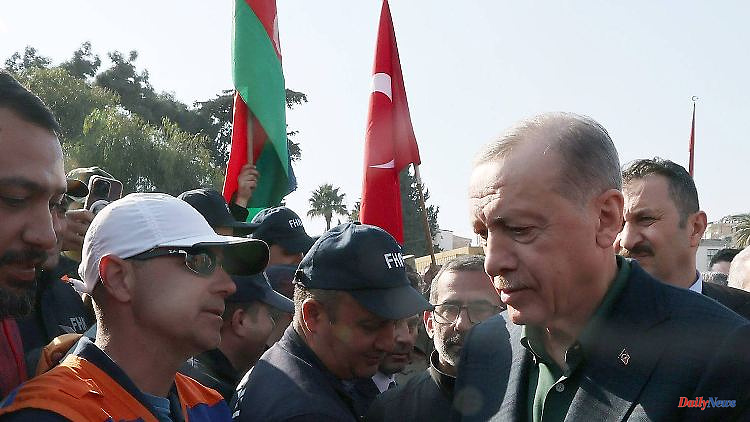Criticism of the government's crisis management after the severe earthquake has not abated. Erdogan apologizes to the people for the first time - but the Turkish President sees external influences as the reasons.
Turkish President Recep Tayyip Erdogan has asked forgiveness for delays in earthquake relief. On February 6, two earthquakes of magnitude 7.7 and 7.6 shook southeast Turkey and northwest Syria. More than 50,000 people have died in Turkey and Syria. According to the government there, more than 173,000 buildings in 11 provinces of the country were destroyed in Turkey alone.
After the earthquake three weeks ago, criticism of the government's crisis management was raised. In many places there were complaints that rescue teams had come to the crisis region too late, in too few numbers and with too little equipment. People buried under rubble could not have been saved in this way. In the earthquake areas, temperatures were below zero in many places, and many of those trapped froze to death. According to eyewitnesses, there are still no tents in the province of Hatay, even three weeks after the first tremors.
Erdogan once again acknowledged omissions and said during a visit to Adiyaman that due to the great destruction, the weather conditions and the damage to the infrastructure, it was not possible to work with the "desired effectiveness" in the first few days. That's why he asks for forgiveness. He also asked for "a year" to heal "most of the wounds from the earthquake". "Like any mortal, we can have flaws, flaws, and flaws." However, Erdogan also warned that people should not listen to the "fools" who attacked state crisis services.
The opposition, on the other hand, criticized the Turkish president's move. Don't accept the apology, wrote the pro-Kurdish party HDP on Twitter. The head of the opposition party Deva said Erdogan could not escape responsibility. The Turkish Red Crescent - the largest charity in Turkey - was also criticized for its handling of the earthquake. She is said to have sold tents for earthquake victims to the private aid organization Ahbap - instead of distributing them for free. Ahbap chairman and musician Haluk Levent confirmed reports on Monday.
Turkey's Red Crescent leader Kerem Kinik admitted his organization supplied 2,050 tents to Ahbap for a fee, but made no profit. A subsidiary responsible for the production of tents made the tents available at the price of the production costs, he wrote on Twitter. The move sparked outrage across the country. According to estimates by the World Bank, the earthquake catastrophe caused pure property damage of at least 34.2 billion US dollars (around 32.4 billion euros) in Turkey alone. That corresponds to four percent of the country's gross domestic product in 2021, according to a corresponding report.
The cost of rebuilding could potentially be more than double. That also depends on the extent to which new building regulations are applied. The disaster-hit regions have Turkey's highest poverty rate and are also home to more than 1.7 million Syrian refugees, the report said. The World Bank estimates that 1.25 million people have been temporarily made homeless as a result of damage to their homes or a complete building collapse.
Most recently, the Turkish government spoke of around two million homeless people. The earthquake hit Turkey in the middle of the election campaign. Before the natural disaster, Erdogan had announced that he would bring forward the parliamentary and presidential elections from June to May 14. It is currently unclear whether he will stick to it.
Meanwhile, another earthquake occurred in the Turkish province of Malatya on Monday. At least one person died and more than 100 were injured, the state news agency Anadolu reported, citing the civil protection authority Afad. The earthquake had a magnitude of 5.5, according to the Kandilli Earthquake. The epicenter was in Yesilyurt Municipality.












